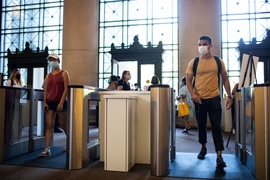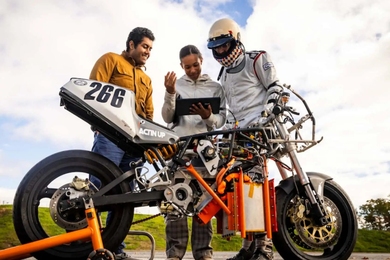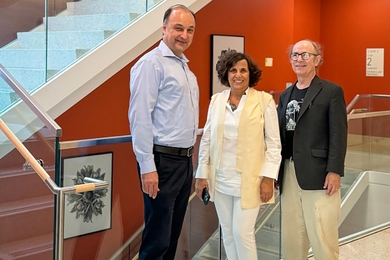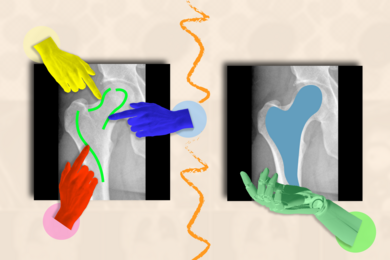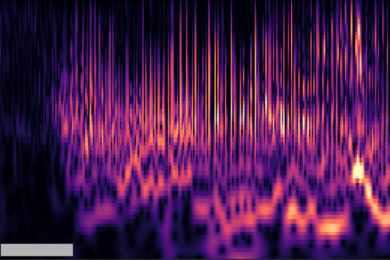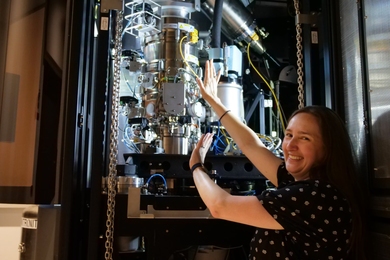Rachel Myers was just 3 years old when her mother was diagnosed with breast cancer. Already a science-minded kid, watching her mom’s resilience in the face of the invasive treatments made her intimately familiar with the symptoms and side effects of cancer treatment. During a high school internship at the National Institutes of Health she fell in love with biomedicine — “I saw people that looked like me in the field, which wasn’t something I was used to before” — and decided to follow her personal connection with science into a career.
Now a junior at University of Maryland Baltimore County majoring in chemical engineering, Myers is one of seven undergraduates from around the United States to participate in the new Materials Initiative for Comprehensive Research Opportunity (MICRO) program, a fully remote, online research internship from the Department of Materials Science and Engineering (DMSE). Myers’ research interests are focused on using nanoparticles as drug delivery therapeutics for breast cancer and other chronic diseases, and the MICRO program offered an unprecedented opportunity to access expertise, mentorship, and approaches to biomedicine that might otherwise have stayed out of reach for undergraduates.
The best of online learning and research
The MICRO internship program launched this past September, funded by a Higher Education Innovation grant from the Abdul Latif Jameel World Education Lab (J-WEL) and orchestrated by DMSE graduate students Cécile Chazot and Max L’Etoile, Digital Learning Lab scientist Jessica Sandland, and professors Alfredo Alexander-Katz and Christine Ortiz. MICRO aims to provide opportunities to a broader, more diverse population of talented undergraduate students at non-MIT institutions who are considering graduate school or a career in a research-related field. Designed from the ground up as an online program, MICRO drew on expertise from the MITx Digital Learning Lab as well as the most important lessons from the shift to remote learning during the pandemic.
“The remote nature of the program removes one potential barrier to access — students can participate even if they are unable to spend a semester at MIT. A remote program also allows students to participate for consecutive semesters, giving them greater continuity in their research,” says Jessica Sandland PhD ’05, who is a lecturer in DMSE and works with faculty to create courses for MITx and incorporate blended and digital technologies into the classroom.
One semester into her internship, Myers has found the online program both rigorous and uniquely rewarding. The internship has two components: research — working directly with MIT faculty, and education — general assignments to give the students a solid understanding of materials science as a field.
Myers is working with Joelle Straehla in Professor Paula Hammond’s lab to use nanoPRISM to identify the genomic determinants of nanoparticle trafficking in cells. “The biggest challenge comes down to learning new techniques in my lab, being exposed to new coding languages I haven’t learned before. Because I don’t have a materials science program at home, thinking like a materials scientist has been a new challenge for me,” she says.
“Rachel has exceeded my expectations and having her as a remote mentee has been a positive experience for us both,” says Straehla. “I am looking forward to continuing to support Rachel on her journey as she applies to graduate schools.”
The interns are limited to participating in research that they can do remotely, such as simulations, data analysis, and computational modeling. The program team put a lot of effort into designing assignments, workflows, and experiences that capitalized on the online format, rather than working around it.
“It was well-designed for an online community. The MICRO staff worked with the researchers before assigning us to make sure the work would be meaningful. It felt very strategic, and not as though it was made up or like a backup plan,” says Myers. “My work is purely computational, but some other students had wet lab elements that they collaborated on in their home schools. I did a lot of data analysis, but it still feels like I’m making very central and significant contributions through my work.”
The learning format is carefully structured, with weekly video lectures on materials science and engineering from MIT faculty, incorporating written reflections and group forum discussions. Other assignments foster science communications skills, such as writing literature reviews and research proposals, a writing workshop, and a final presentation at the end of the semester.
Of course, there are a few extra touches to drive home the MIT experience: “While watching a lecture by Professor Jeffrey Grossman, we received goody bags from the MICRO team. Professor Grossman does a lot of interactive work with his students, so the MICRO staff sent us materials to build unit cells and do other exercises, which made an already profound experience all the more fun and engaging.”
PhD student Cécile Chazot also shepherded the interns through the process of submitting abstracts and creating posters for a research conference. “Her feedback was really helpful, because it was my first time presenting my own research at a national conference,” says Myers, who won the Outstanding Presentation Award at ABRCMS, the Annual Biomedical Research Conference for Minority Students.
A mindful approach to mentorship
The most important part of making MICRO work as an online internship is fostering genuine relationships between the interns and their mentors. Grad students Chazot and L’Etoile have been an important source of support and advice, serving as professional mentors, helping navigate the graduate admissions process, and providing advice on fellowship applications in addition to leading assignments and discussions.
Chazot also developed a wide-ranging set of mentor/mentee training worksheets. These covered a wide range of topics, from planning a good remote research project to communicating in an effective and inclusive manner while working remotely. Based on the current research on best practices in online learning, diversity and inclusion, and more, the trainings offered in-depth insights on mitigating stereotype threat, situational cues, solo status and underrepresentation, and cognitive load. Each training highlighted specific goals, examples, and framing with the goal of improving trust, comfort, and performance from both mentors and interns.
“My favorite part of the program has been the relationships that we’ve been able to build with the MICRO faculty and our mentors in an online environment. It was really well-planned, and it gave us the confidence we needed to progress as scientists,” says Myers. “A lot of us haven’t had as extensive an experience at school as we wanted to because of Covid, and this program has really helped us overcome that. They were really intentional about instilling confidence in us.”
This focus on mentorship also speaks to MICRO’s broader mission of making the field of materials science more accessible, more inclusive, and more populated by people who hold mentorship and inclusion as primary goals.
This goal hits a chord with Myers, who wants to bring as many young people as possible — especially students of color — into the science field. “I want to show them what research really looks like and how exciting it can be, and get them into it and help them see themselves in it,” she says. “As I get older I’d like to be a principal investigator and science communicator. My ambition has been reinforced throughout the pandemic by seeing people in my community, the African American community, struggling so much with the science of what’s going on, especially since we’ve been left out historically.”
Increasing demand for online opportunities
MICRO’s first group of undergraduate researchers finished their first semester in December, and six of the seven interns, including Myers, are continuing at least through the spring semester. DMSE hopes to continue to run and expand the program.
“Even though MICRO is only in its first year, we were able to accept fewer than 10 percent of the applicants to the program,” says Sandland, noting that there’s clearly an appetite for MIT-caliber, online-based research opportunities.
“I think that the pandemic taught us that there are a lot of things that we can do successfully online that we never used to think about doing online,” she says. “Certainly, there are limitations to the types of research a student can do remotely, but we found that there really are a lot of ways that a student can make a meaningful contribution to the research going on at MIT, even if they can’t physically be in the laboratory.”


